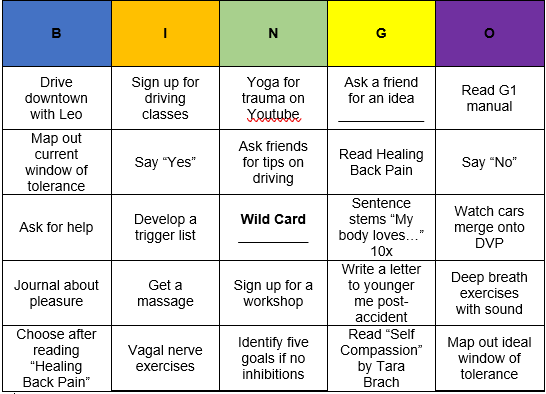Like many writers I know, I am in therapy.
It’s a powerful currency thrown around in writing groups, woven carefully into our bodies of writing. “My therapist says…”, or “In therapy, I discovered.”
For me, writing came first (January 2021), self-help literature second (autumn 2021) and then therapy (February 2022).
I’m not here to convince anyone to sign up for therapy (but please do take a writing class, it’s very empowering). Like I said last week, my journey is not yours and yours is not mine. (However, because I am an overthinker, below is a brief Frequently Asked Questions section on therapy).
My current therapy program is cognitive behavioural therapy, i.e., talk therapy. I bring up an issue like my fear of driving. We talk about my previous car accidents, my avoidance pattern (of giving up my license), my fears (of crashing a car, of killing a fellow driver, passenger, or pedestrian). And together, we reframe my fears, identify patterns of “all or nothing” thinking, ideate strategies to ease anxieties in the car. You get the idea.
You might also glean that talk therapy is a slow process. Results are not immediate. And yet, I am a pragmatist. I like action. I thrive on tangible results and progress. Therapy, then, could be a useful exercise in patience. Just not for me. As those closest to me suggest, I may never fully learn the art of patience. I am OK with that.
What is my solution?
Obnoxious drum roll, please.
THERAPY BINGO.
In my bullet journal (my latest journal, I currently have three different journals on the go), I create a full page bingo card filled with challenges and activities for the three weeks between sessions. Thematically, these activities align with the topics covered in our session.
Here is a mock-up of a BINGO therapy card that focuses predominantly on driving. My bingo cards are 6 columns by 7 rows, totaling 42 activities.
The beauty of this BINGO card, for me, is that:
It is time-limited to a three-week interval.
The activities are focused. The theme might be more abstract, but the activities I choose must be specific and multiple. It really pushes my thinking.
It is playful (I love play, creativity, imagination, bright colours).
I can choose what “winning” looks like - is it a full card, a row, a column. At first, I thought I would complete every activity- nope, that has yet to happen.
The prize is intrinsic. I don’t need to reward myself with a monetary prize for BINGO. I feel pride. And plus, like some of the activities like massages are also a prize.
BINGO doesn’t have to be attached to therapy. I can create multiple cards to focus on areas where I want to develop further like writing, career development, etc.
I can see progress in two key ways: (1) progress is card-specific; and, (2) I can measure progress as the cards develop - what activities did I consider challenging earlier on vs. what do I consider challenging now.
Let me know in the comments what you think of this! Also, please share if you develop your own BINGO therapy card. I would love to cheer you on!
FAQs
How often does one need to see a therapist?
The Internet suggests every week, especially in the beginning. I cannot afford a weekly session at $150 per 50 minutes. I go every three weeks. My schedule is an imbalanced combination of need and financial parameters.
Do you ever get annoyed at the cost of therapy?
Um, yes. Sometimes, I tell my therapist I’m resistant to talk about subject X because I don’t want to spend our 50 minutes together or $150 on it. She reminds that therapy is a bit of a swamp - we talk about X and other themes will come up. Sometimes, she also says, it’s good to talk about “the here and now” (where there’s energy). Usually, by the end of the session, I feel lighter (and thus, less annoyed/angry at the economic cost of subject X). Check out Hard Feelings Toronto for affordable therapy programs and resources.
Why would I see a therapist when I can just share with friends?
Totally get this. Like I said earlier, I’m not here to convince anyone to sign up for therapy, although I do believe everyone can benefit from it. Also, it’s great to have a social network and to talk through challenges and setbacks with friends. We all need this, too! A word of caution - many of us have been in positions where friends might “emotionally dump on us” and it can result in friendship burnout and even resentment. It’s ok for the friend to set boundaries and also it may be wise for the individual to identify supplementary coping strategies.




i love you katlyn!!!